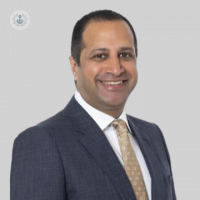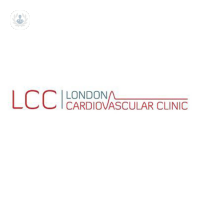What is it?
The patent foramen ovale (PFO), also known by its colloquial name of “hole in the heart”, is a cardiac defect consisting in a small hole in the cardiac muscle, located between the right and left upper chamber (atria) of the heart.
PFO is normal in babies when they are still in the womb, because a baby’s lungs are not working yet and that small hole allows blood to circulate between the heart’s atria. It is also fundamental for blood oxygenation and for the correct functioning of the circulatory system. However, after birth or during the baby’s first year, the small hole should close.

What are the symptoms?
This condition is quite widespread - 30 per cent of the adult population is affected by it. PFO can potentially become a severe condition, because it does not cause any immediate symptoms. There is a higher risk of complications for people who suffer from both cardiac and neurological disorders and for people who engage in underwater sports.
What causes it?
It is not clear yet what causes PFO, although it may be possible for this condition to be associated with a genetic mutation. However, this theory has not been conclusively confirmed yet.
How can it be treated?
Currently, the condition is mostly diagnosed by doing a transcranial ecodoppler.
PFO can be treated with surgery, which may be recommended if there are also other cardiac conditions (especially in children), if another concurrent cardiac disorder arises, if the blood stops flowing to the lungs, or if there are recurring strokes (especially for adults).
There are two types of procedures to close the PFO:
- Catheter procedure: A small device, which can expand, is inserted within your heart through a catheter. The device covers up the hole in between the atria. This is a percutaneous procedure, and is less invasive when compared to regular surgery.
- Surgical closure: This is an “open heart procedure” and although it may be riskier than the percutaneous procedure, it is very helpful for people who are also suffering from other cardiac conditions.
People suffering from PFO and with a predisposition to blood clot formation also need to get started on medication to prevent or reduce the possibility of stroke.
Which doctor should I talk to?
The healthcare professionals who treat PFO are cardiologists and cardiothoracic surgeons.
07-18-2016 10-04-2023Patent foramen ovale
Dr Alexander Lyon - Cardiology
Created on: 07-18-2016
Updated on: 10-04-2023
Edited by: Carlota Pano
What is it?
The patent foramen ovale (PFO), also known by its colloquial name of “hole in the heart”, is a cardiac defect consisting in a small hole in the cardiac muscle, located between the right and left upper chamber (atria) of the heart.
PFO is normal in babies when they are still in the womb, because a baby’s lungs are not working yet and that small hole allows blood to circulate between the heart’s atria. It is also fundamental for blood oxygenation and for the correct functioning of the circulatory system. However, after birth or during the baby’s first year, the small hole should close.

What are the symptoms?
This condition is quite widespread - 30 per cent of the adult population is affected by it. PFO can potentially become a severe condition, because it does not cause any immediate symptoms. There is a higher risk of complications for people who suffer from both cardiac and neurological disorders and for people who engage in underwater sports.
What causes it?
It is not clear yet what causes PFO, although it may be possible for this condition to be associated with a genetic mutation. However, this theory has not been conclusively confirmed yet.
How can it be treated?
Currently, the condition is mostly diagnosed by doing a transcranial ecodoppler.
PFO can be treated with surgery, which may be recommended if there are also other cardiac conditions (especially in children), if another concurrent cardiac disorder arises, if the blood stops flowing to the lungs, or if there are recurring strokes (especially for adults).
There are two types of procedures to close the PFO:
- Catheter procedure: A small device, which can expand, is inserted within your heart through a catheter. The device covers up the hole in between the atria. This is a percutaneous procedure, and is less invasive when compared to regular surgery.
- Surgical closure: This is an “open heart procedure” and although it may be riskier than the percutaneous procedure, it is very helpful for people who are also suffering from other cardiac conditions.
People suffering from PFO and with a predisposition to blood clot formation also need to get started on medication to prevent or reduce the possibility of stroke.
Which doctor should I talk to?
The healthcare professionals who treat PFO are cardiologists and cardiothoracic surgeons.


Can you live with a hole in your heart?
By Dr Mark Mason
2025-01-20
It is very possible to live with a hole in your heart, without ever realising that it’s there. A patent foramen ovale, also known as a PFO, is a hole between the left and right atria (upper chambers) of the heart that we all have when we are in the womb, but this should close shortly after we’re born. It remains open, however, in around 20% of people, the majority of whom are oblivious to this hole. Cardiologist Doctor Mark Mason talks more about patent foramen ovale and when it requires treatment. See more
Experts in Patent foramen ovale
-
Dr Michael Mullen
CardiologyExpert in:
- Atrial septal defect
- Valvular heart disease
- Mitraclip
- TAVI (transcatheter aortic valve implantation)
- Patent foramen ovale
- Mitral regurgitation
-
Dr Iqbal Malik
CardiologyExpert in:
- Coronary angioplasty
- TAVI (transcatheter aortic valve implantation)
- Atrial septal defect
- Patent foramen ovale
- Coronary heart disease
- Heart attack
-
Dr Sen Sankar
CardiologyExpert in:
- Echocardiogram
- Coronary heart disease
- Valvular heart disease
- Arrhythmia
- Patent foramen ovale
- Sports cardiology
-
Dr Amit Bhan
CardiologyExpert in:
- Atrial septal defect
- Patent foramen ovale
- Congenital heart disease
- Stroke
- Chest pain
- Palpitations
-
Dr Brian Clapp
CardiologyExpert in:
- Angiography
- Coronary heart disease
- Atrial septal defect
- Patent foramen ovale
- Interventional cardiology
- Heart attack
- See all

London Bridge Hospital - part of HCA Healthcare
London Bridge Hospital - part of HCA Healthcare
27 Tooley St
No existe teléfono en el centro.
By using the telephone number provided by TOP DOCTORS, you automatically agree to let us use your phone number for statistical and commercial purposes. For further information, read our Privacy Policy
Top Doctors

The Wellington Hospital - part of HCA Healthcare
The Wellington Hospital - part of HCA Healthcare
Wellington Hospital South Bldg, 8A Wellington Pl, NW8 9LE
No existe teléfono en el centro.
By using the telephone number provided by TOP DOCTORS, you automatically agree to let us use your phone number for statistical and commercial purposes. For further information, read our Privacy Policy
Top Doctors

London Cardiovascular Clinic
London Cardiovascular Clinic
66 Harley Street, London, W1G 7HD
No existe teléfono en el centro.
By using the telephone number provided by TOP DOCTORS, you automatically agree to let us use your phone number for statistical and commercial purposes. For further information, read our Privacy Policy
Top Doctors
-
London Bridge Hospital - part of HCA Healthcare
27 Tooley St, Central LondonExpert in:
- 24-hour service
- Cardiology
- Minimal access surgery (keyhole surgery)
- Orthopaedic surgery
- Cardiovascular disease
- Gastroenterology
-
The Wellington Hospital - part of HCA Healthcare
Wellington Hospital South Bldg, 8A Wellington Pl, NW8 9LE, Central LondonExpert in:
- Digestive
- Cardiology
- Orthopaedic surgery
- Orthopaedic spinal surgery
- Intensive care
- Spine
-
London Cardiovascular Clinic
66 Harley Street, London, W1G 7HD, W1G Marylebone LondonExpert in:
- Arrhythmia
- Cardiology
- Cardiovascular disease
- Hypertension
- Vascular Surgery
- See all
- Most viewed diseases, medical tests, and treatments
- Electrophysiology study
- Genetic testing
- Heart murmur in children
- Anxiety
- Long Covid
- Fainting in children
- Medicolegal
- Robotic surgery
- Hypertension (high blood pressure)
- MRI








